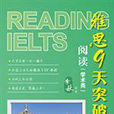《雅思9天突破9分——閱讀(學術類)》是中國人民大學出版社於2015年出版的圖書。
基本介紹
- 書名:雅思9天突破9分——閱讀(學術類)
- 作者:李秋
- ISBN:978-7-300-21629-4
- 定價:¥59.80
- 出版社:中國人民大學出版社
- 出版時間:2015-09-30
- 裝幀:平
- 開本:16
作者簡介,內容簡介,目錄,精彩片段,
作者簡介
李秋,北京師範大學碩士。多年來一直從事新托福、雅思的教學工作,積累了大量的雅思考試第一手資料,對雅思考試的出題規律有深入的研究,對解題思路有獨到的見解,培訓了數萬名雅思高分考生。主要著作有《雅思周計畫——閱讀》、《劍橋雅思全真試題9最新解析》、《劍橋雅思全真試題8最新解析》等。
內容簡介
《雅思9天突破9分——閱讀(學術類)》全書包括四章,考生用9天的時間即可完成學習。根據書中提供的“9天學習計畫表”即可實現。書中第一章是閱讀基本功強化訓練,即“長難句結構拆解100句”,夯實基礎,厚積薄發。第二章是快速定位答案的方法,包括“主題句掃描法”和“關鍵字對應法”提高搜尋定位的效率。第三章是九種題型詳解和真題演練,分類詳解,分而治之。第四章是終極挑戰,即4套真題及答案解析,考前實踐,水到渠成。
目錄
第一章 閱讀基本功強化訓練——長難句結構拆解100句
第二章 快速定位答案的方法
第一節 主題句掃描法——提高定位效率
一、1分鐘掃描主題句
二、真題示例
第二節 關鍵字對應法——快速確定答案
一、哪些詞不能作關鍵字
二、特殊關鍵字——專有名詞和數字
三、一般關鍵字——句子的“語法重點”和“邏輯重點”
四、真題示例
第三章 九種題型詳解和真題演練
第一節 找段落小標題
一、找段落小標題的特徵
二、必須掌握的四個關鍵點
三、真題實戰及詳解
第二節 配對題
一、配對題的特徵
二、必須掌握的三個關鍵點
三、真題實戰及詳解
第三節 判斷題
一、判斷題的特徵
二、必須掌握的三個關鍵點
三、答案的規律性
四、真題實戰及詳解
第四節 簡答題
一、簡答題的特徵
二、必須掌握的三個關鍵點
三、真題實戰及詳解
第五節 完成句子填空題
一、完成句子填空題的特徵
二、必須掌握的三個關鍵點
三、真題實戰及詳解
第六節 摘要填空題
一、摘要填空題的特徵
二、必須掌握的三個關鍵點
三、真題實戰及詳解
第七節 圖表填空題
一、圖表填空題的三種類型和特徵
二、必須掌握的三個關鍵點
三、真題實戰及詳解
第八節 單項選擇題
一、單項選擇題的特徵
二、必須掌握的兩個關鍵點
三、真題實戰及詳解
第九節 多項選擇題
一、多項選擇題的特徵
二、必須掌握的兩個關鍵點
三、真題實戰及詳解
第四章 終極挑戰——實戰演習真題4套及答案解析
Test 1
Test 1 答題卡
Test 1 答案詳解
Test 1 答案速查
Test 2
Test 2 答題卡
Test 2 答案詳解
Test 2 答案速查
Test 3
Test 3 答題卡
Test 3 答案詳解
Test 3 答案速查
Test 4
Test 4 答題卡
Test 4 答案詳解
Test 4 答案速查
精彩片段
【Cambridge IELTS 9 Test 3 READING PASSAGE 1】
You should spend about 20 minutes on Questions 1-13, which are based on Reading Passage 1 below.
Attitudes to language
第一段
It is not easy to be systematic and objective about language study. Popular linguistic debate regularly deteriorates into invective and polemic. Language belongs to everyone, so most people feel they have a right to hold an opinion about it. And when opinions differ, emotions can run high. Arguments can start as easily over minor points of usage as over major policies of linguistic education.
譯文: 語言研究要做到系統性和客觀性並不容易。語言學上的普通爭論經常會發展成抨擊和論戰。語言是屬於每一個人的,所以很多人覺得他們有權利對語言持有自己的意
見。當意見相左時,則會激起人們的情緒。語言用法方面的小事,就能像語言教育政策中的重大問題一樣很容易引起爭論.精析: 尾句是主題句。關鍵字是Arguments…start…usage…linguistic education(爭議……出現……用法……語言教育)。
第二段
Language, moreover, is a very public behaviour, so it is easy for different usages to be noted and criticised. No part of society or social behaviour is exempt: linguistic factors influence how we judge personality, intelligence, social status, educational standards, job aptitude, and many other areas of identity and social survival. As a result, it is easy to hurt, and to be hurt, when language use is unfeelingly attacked.
譯文: 此外,語言是一種非常具有公共性的行為,所以人們很容易留意、評論語言上的不同用法。社會和社會行為沒有哪一方面能脫離語言:語言因素會影響到我們如何評判一個人的人格、智商、社會地位、教育標準、工作能力以及很多其他與身份和社會生存相關的方面。因此,當無意間發生語言攻擊時,人們很容易傷害他人或者受到傷害。
精析: 首句是主題句。關鍵字是public behaviour…different usages…noted…criticised(是公共行為……不同用法……被關注……被評論)。
You should spend about 20 minutes on Questions 1-13, which are based on Reading Passage 1 below.
Attitudes to language
第一段
It is not easy to be systematic and objective about language study. Popular linguistic debate regularly deteriorates into invective and polemic. Language belongs to everyone, so most people feel they have a right to hold an opinion about it. And when opinions differ, emotions can run high. Arguments can start as easily over minor points of usage as over major policies of linguistic education.
譯文: 語言研究要做到系統性和客觀性並不容易。語言學上的普通爭論經常會發展成抨擊和論戰。語言是屬於每一個人的,所以很多人覺得他們有權利對語言持有自己的意
見。當意見相左時,則會激起人們的情緒。語言用法方面的小事,就能像語言教育政策中的重大問題一樣很容易引起爭論.精析: 尾句是主題句。關鍵字是Arguments…start…usage…linguistic education(爭議……出現……用法……語言教育)。
第二段
Language, moreover, is a very public behaviour, so it is easy for different usages to be noted and criticised. No part of society or social behaviour is exempt: linguistic factors influence how we judge personality, intelligence, social status, educational standards, job aptitude, and many other areas of identity and social survival. As a result, it is easy to hurt, and to be hurt, when language use is unfeelingly attacked.
譯文: 此外,語言是一種非常具有公共性的行為,所以人們很容易留意、評論語言上的不同用法。社會和社會行為沒有哪一方面能脫離語言:語言因素會影響到我們如何評判一個人的人格、智商、社會地位、教育標準、工作能力以及很多其他與身份和社會生存相關的方面。因此,當無意間發生語言攻擊時,人們很容易傷害他人或者受到傷害。
精析: 首句是主題句。關鍵字是public behaviour…different usages…noted…criticised(是公共行為……不同用法……被關注……被評論)。

